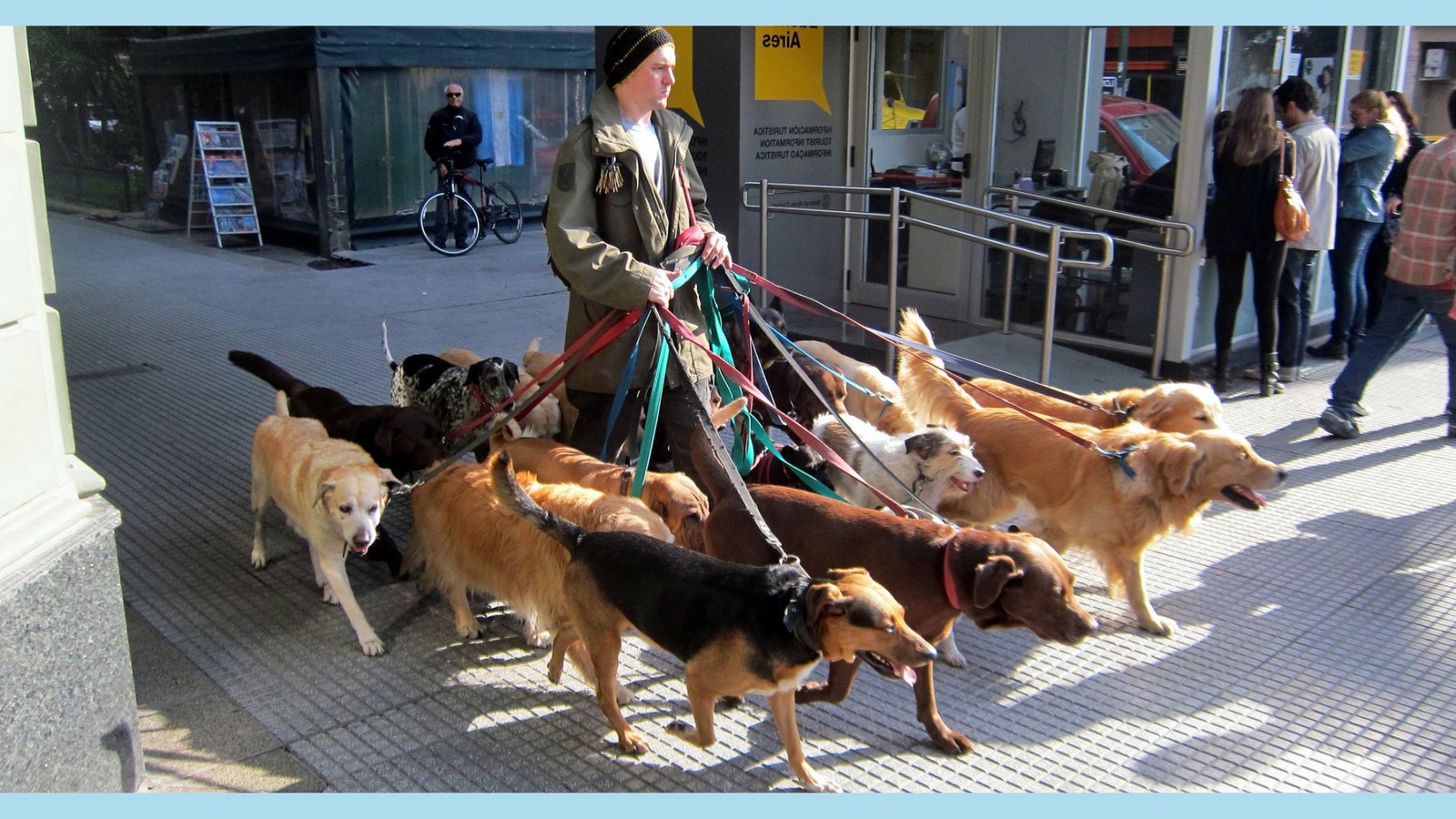The daily ritual of walking our dogs is a cherished activity for many pet owners, fostering the bond between a human and a dog. However, the enthusiasm for walks varies among dogs. While some eagerly wag their tails and pull at the leash, others may resist, displaying signs of discomfort or reluctance. So, why some dogs love walks while others don’t?

DOG PERSONALITIES AND PREFERENCES
Let’s explore the intriguing question, why do some dogs love walks while others don’t, they hate them? Uncover the factors influencing your dog’s walking preferences, understand their behavior, and discover tips to make walks an enjoyable experience for every furry friend.
Dog Breed-Specific Traits
Different dog breeds have unique characteristics and energy levels that influence their attitude toward walks. Energetic breeds, such as Border Collies or Labrador Retrievers, often relish outdoor activities, while more laid-back breeds may show less enthusiasm. Tailoring walks to suit your dog’s breed traits ensures that the activity aligns with their natural inclinations.
Individual Dog Temperament
Just as humans have diverse personalities, dogs exhibit individual temperaments that shape their preferences. Some dogs are naturally adventurous and curious, thriving on the sensory stimulation walks provide. Others may be more reserved or anxious, making outdoor excursions less appealing. Recognizing your dog’s unique temperament allows you to cater to their specific needs during walks.

IDENTIFYING FACTORS THAT INFLUENCE WALKING PREFERENCES
Early Dog Experiences and Socialization
Early experiences and socialization play a crucial role in shaping a dog’s perception of walks. Dogs exposed to positive outdoor experiences during puppy-hood are more likely to associate walks with enjoyment. Conversely, dogs with negative encounters, such as frightening encounters with other dogs or loud noises, may develop aversions. Gradual desensitization and positive reinforcement can help overcome negative associations and build a positive connection with walks.
Dog Health and Physical Comfort
Dogs experiencing discomfort or pain may exhibit resistance to walks. Joint issues, arthritis, or injuries can make walking painful, leading to reluctance. Observing your dog for signs of discomfort, such as limping or stiffness, is crucial in identifying potential health-related aversions. Regular veterinary check-ups and appropriate medical interventions contribute to maintaining your dog’s physical comfort.
Environmental Sensitivities
Environmental factors, such as extreme weather conditions or unfamiliar surroundings, can impact a dog’s comfort during walks. Dogs with heightened sensitivities to temperature, noise, or new stimuli may express aversions to certain outdoor environments. Gradual exposure and positive reinforcement can help desensitize dogs to environmental factors that may cause distress.

TIPS FOR MAKING DOGS TO LOVE WALKS
Positive Reinforcement Techniques for Dogs to Love Walks
Implementing positive reinforcement techniques can transform walks into enjoyable experiences for reluctant dogs. Rewarding good behavior with treats, praise, or play during and after walks reinforces positive associations. Consistency in positive reinforcement builds trust and encourages a positive attitude toward walks.
Varied Walking Routes and Activities
Dogs, like humans, appreciate variety and mental stimulation. Varying your walking routes and incorporating activities, such as interactive games or allowing time for sniffing and exploring, can make walks more engaging for dogs with diverse preferences. Catering to your dog’s need for mental engagement contributes to a more enjoyable walking experience.
Gradual Desensitization
For dogs with specific aversions or anxieties, gradual desensitization is a valuable technique. Introduce elements that trigger discomfort in a controlled and gradual manner, allowing your dog to acclimate over time. Patience and a slow-paced approach help build confidence and reduce aversions.
Consideration of Physical Limitations
Dogs with physical limitations may benefit from tailored walking routines. Shorter, more frequent walks, and exercises that accommodate their abilities contribute to a positive experience. Consult with your veterinarian to create a walking plan that aligns with your dog’s physical condition.
Customizing walks to suit your dog’s physical capabilities ensures a comfortable and enjoyable experience. The reasons why some dogs love walks while others hate them are as diverse as the dog population itself.
Recognizing and respecting If Your Dogs Love Walks or Don’t
By understanding your dog’s breed-specific traits, individual temperament, and addressing potential influences, you can tailor walks to suit their preferences and foster a positive association with outdoor activities.
Whether your dog thrives on the thrill of exploration or prefers a more relaxed pace, the key lies in recognizing and respecting their unique needs.
Through positive reinforcement, gradual desensitization, and consideration of individual factors, every walk can become an opportunity for bonding and joy between you and your dog.

EXPLORING THE CONTRASTS BETWEEN ADVENTUROUS DOGS THAT LOVE WALKS AND RESERVED ONES
Dogs, our loyal companions, come in a delightful array of personalities. From the bold and adventurous to the calm and reserved, dogs exhibit unique traits that shape their interactions with the world around them. Further in this exploration, we dive into the fascinating realm of adventurous vs. reserved dogs, uncovering the factors that influence these distinct personalities, understanding their behaviors, and offering insights to celebrate and cater to the individual needs of each furry friend.
The Adventurous Dogs Spirit Love Walks
- Breed-Specific Adventure: Adventure often finds its roots in breed characteristics. Certain breeds, like Australian Shepherds, Border Collies, and Siberian Huskies, are renowned for their adventurous spirits.
These breeds typically thrive on mental and physical stimulation, craving activities that challenge their agility and intelligence. Recognizing breed-specific tendencies helps tailor activities that align with their adventurous nature.
- Curiosity and Exploration: The adventurous dog’s curiosity knows no bounds. They eagerly explore their surroundings, sniffing, digging, and investigating every nook and cranny. This curiosity reflects a healthy and engaged mind, as these dogs actively seek out new experiences to satisfy their inquisitive nature. Providing ample opportunities for exploration contributes to the mental well-being of adventurous dogs.
- Outdoor Activities and Exercise: Adventurous dogs thrive on outdoor activities that challenge their physical prowess. Hiking, agility courses, and interactive play sessions are ideal for meeting their exercise needs. Regular engagement in these activities not only keeps them physically fit but also nurtures their adventurous spirit. Incorporating a variety of outdoor exercises ensures that adventurous dogs stay active and content.
The Reserved Dog Essence
- Gentle Demeanor and Calm Presence: Reserved dogs exude a gentle demeanor and a calm presence.
Breeds like Basset Hounds, Cavalier King Charles Spaniels, and Shih Tzus often embody this personality. Their tranquil nature makes them excellent companions for those seeking a more laid-back and relaxed canine friend. Appreciating the gentle nature of reserved dogs fosters a harmonious relationship with their owners.
- Comfort in Familiar Environments: Reserved dogs find comfort and security in familiar environments.
They may take time to warm up to new people, places, or experiences. Providing a consistent and stable home environment allows reserved dogs to thrive and express their true personalities.
Establishing a routine and avoiding sudden changes contributes to the well-being of reserved dogs.
- Mindful Observers: Reserved dogs are often keen observers, taking in their surroundings with a watchful eye. They may prefer to assess a situation before actively participating. This behavior showcases their thoughtful approach, as they carefully navigate the world around them. Allowing reserved dogs the time to observe fosters a sense of confidence and security.

Nurturing Both Personalities: Tips for Pet Owners
- Balancing Activities for Adventurous Dogs: While adventurous dogs thrive on physical and mental challenges, it’s essential to strike a balance to prevent over-stimulation. Incorporate periods of rest and relaxation between activities to ensure they have the opportunity to recharge. A well-rounded approach to activities supports the overall well-being of adventurous dogs.
- Creating Safe Spaces for Reserved Dogs: Reserved dogs benefit from having designated safe spaces where they can retreat when feeling overwhelmed. These spaces, equipped with familiar items like blankets or toys, offer a refuge where reserved dogs can relax and recharge. Designing safe spaces provides reserved dogs with a sense of security and control.
- Gradual Exposure to New Experiences: For both adventurous and reserved dogs, gradual exposure to new experiences is key. Whether introducing them to new people, environments, or activities, allowing dogs to acclimate at their own pace builds confidence and reduces stress. Patience and positive reinforcement contribute to successful introductions for dogs of all personalities.
Celebrating the Diversity of Dog Personalities
Tailoring training approaches to suit the individual needs of adventurous and reserved dogs enhances the learning experience. While adventurous dogs may thrive on interactive training games, reserved dogs may respond better to calm and reassuring training methods. Understanding their learning styles promotes effective communication and strengthens the bond between dogs and their owners.
Brief sum up on why some dogs love walks while others don’t
In the dynamic world of dogs, the spectrum of personalities enriches the human-canine bond. Whether your dog is a spirited adventurer or a calm observer, appreciating their unique qualities fosters a deeper connection.
By understanding the factors that shape adventurous and reserved personalities, pet owners can tailor their interactions, creating a harmonious and enriching environment for their beloved companions.
Embracing the diversity of dog personalities allows us to celebrate the individuality of each dog, fostering a relationship built on mutual understanding, respect, and shared joy. Hopefully this article showed you why some dogs love walks while others don’t!
Read more on the topic: Dog Walking!









